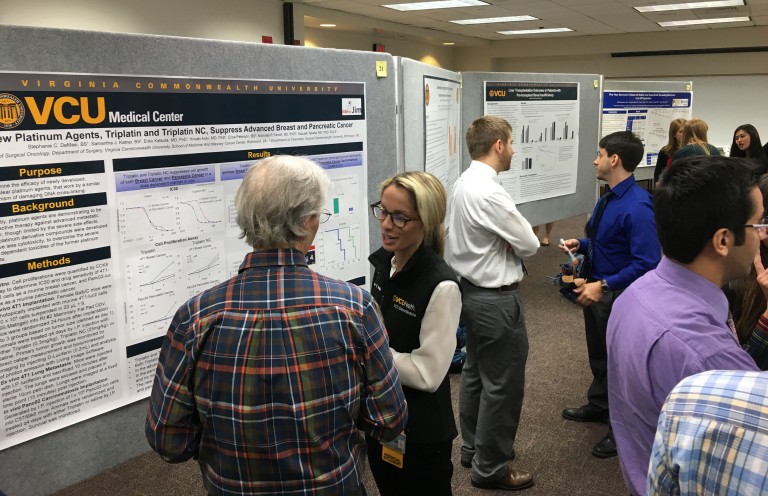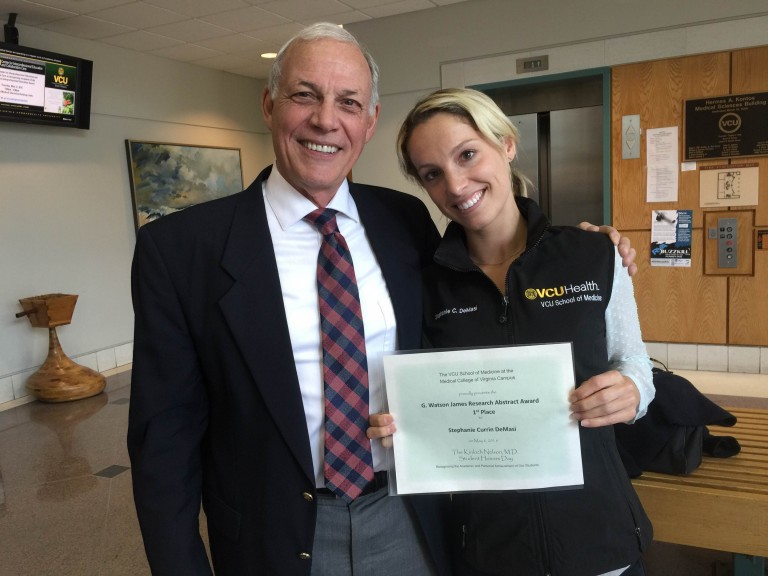
The Class of 2018’s Stephanie DeMasi took first place at Medical Student Research Day. The judges reported that the quality and quantity of her research was exceptional given the limited time period in which the research was conducted, and particularly so given that this was her initial experience with a bona fide research project.
The 2016 Medical Student Research Day featured poster presentations from both the basic and clinical sciences, with students tackling topics as diverse as dengue and chikungunya viruses, surviving melanoma and hand hygiene in the operating room. There were also several research projects that examined medical education topics like encouraging compassion and learning to place intravenous catheters.
With 49 medical students participating, Jan Chlebowski, Ph.D., associate dean for graduate education, noted it was the largest number of presenters in the event’s three-year history.
“Having M.D. students gain some type of research experience during their training has been a point of emphasis by the medical school’s dean, Dr. Jerry Strauss, and also by the LCME, the accrediting body for the M.D. program,” said Chlebowski.
Student interest in research has been steadily growing over the past eight years, and the introduction of the M.D. program’s new curriculum has provided more opportunities for students to build research experience over the course of their training.
Dean of Medicine Jerry Strauss III, M.D., Ph.D., was on hand to review the research and speak with the presenters.
“It was an impressive show of talent! The research projects were diverse, and the students who walked me through their posters were extremely knowledgeable,” said Strauss. “This was a truly exceptional year in terms of the number of participants, and the quality of the work presented. I am particularly grateful to the research mentors who invested significant time and effort in making these research experiences productive and rewarding.”
The posters presented at Medical Student Research Day are eligible for prizes of $1,000, $500 and $250. A panel of judges reviewed the presentations’ originality, understanding, clarity and discussion.

Stephanie DeMasi with Jack Haar, professor emeritus of anatomy and neurobiology, who established the James D. Popp Summer Research Fellowship that made DeMasi’s research possible.
This year’s winning entry was the Class of 2018’s Stephanie DeMasi, New Platinum Agents, Triplatin and Triplatin NC, Suppress Advanced Breast and Pancreatic Cancer. With financial support from the James D. Popp Summer Research Fellowship, she conducted the research under the guidance of Kazuaki Takabe, M.D., Ph.D., associate professor of surgery.
“The judges felt that the quality and quantity of the research achieved by the winner was exceptional given the limited time period in which the research was conducted,” Chlebowski said. Their interactions with DeMasi during her presentation provided convincing evidence of her immersion and understanding of the complex nature of the study..
“This was compounded by the report that this was her initial experience with a bona fide research project.”
The judges also awarded:
– Second place to the Class of 2017’s Mashya Abbassi and Reza Nabavizadeh, co-presenters and classmates, and
– In a tie for third place: the Class of 2018’s Christopher Bednarz and the Class of 2018’s Imran Khatri.
Many of the research findings described in the poster presentations were products of the Medicine Student Summer Research Fellowship Program. The student-initiated eight-week projects take place between the students’ first and second years of medical school.
“Students submit a proposed project and have to identify a faculty mentor on their own,” explained Chlebowski. If the project is approved, students receive a $2,500 stipend to support their research.
By Erin Lucero